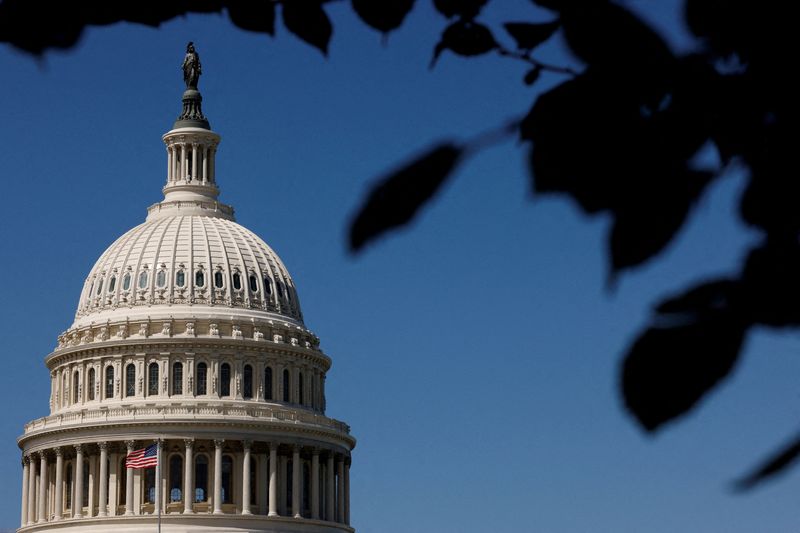A look at the day ahead in U.S. and global markets by Mike Dolan
After the worst week since March on Wall St, three issues keep the pressure - a possible U.S. government shutdown at the end of this week, rising annual oil prices and a heavy diary of Treasury debt sales.
Even before U.S. markets kick off on Monday, China's ongoing property bust threw another curve ball at stocks markets there.
Shares of the ailing China Evergrande (HK:3333) plunged 21.8% after the developer said it was unable to issue new debt due to an ongoing investigation into one of its subsidiaries, dealing a fresh blow to its restructuring plans.
Country Garden fell more than 7% as investors nervously watch out for its latest dollar bond coupon payment on Wednesday.
Concerns about the smouldering real estate problem knocked China's main bourses again by another 0.6%, but Hong Kong's Hang Seng plunged 1.8%.
Perhaps as worrying for foreign investors was anxiety surrounding the fate of Nomura's head of China investment banking Charles Wang Zhonghe as Chinese authorities overseeing the firm's banking operations ordered him not to leave the mainland.
With world markets also still smarting generally from hawkish U.S. Federal Reserve soundings last week, MSCI's all-country index hit its lowest level since June 2 and was down for the seventh trading session in a row - its longest losing streak in over a year.
And there appeared to be little hope of an early bounce on Wall St, where the S&P500 hit its lowest in three months on Friday and futures are back in the red again on Monday.
Fed aside, there were multiple domestic issues to trouble the horizon - not least a government shutdown next weekend.
Congress so far has failed to finish any of the 12 regular spending bills to fund federal agency programs in the fiscal year starting on Oct. 1 - no agreement by then means Washington runs out of money to keep the government fully operating.
House of Representatives Speaker Kevin McCarthy will push an ambitious plan this week to win approval of four large bills, including military and homeland security funding, that he hopes would demonstrate enough progress to far-right Republicans to win their support for a stop-gap spending bill.
While economists think a short-term shutdown lasting just a few weeks will not have a lasting impact on overall growth, some banks, such as Morgan Stanley, feel the timing could affect fourth-quarter data enough to prevent the Fed from delivering the one final 2023 rate hike it indicated last week.
But with oil prices backing up sharply again this month, the inflation picture - to be sketched out again later this week with the August PCE gauge - has been complicated.
U.S. crude prices have held most of September's gains and year-on-year price gains that feed annual headline inflation are now running at 15% - their highest annual pace of the year so far.
With that messy picture of a government shutdown and energy price rebound, another heavy U.S. Treasury debt auction schedule kicks off on Tuesday with a 2-year note sale - followed by a 3-year note auction on Wednesday and seven-years on Wednesday.
U.S. 10-year Treasury yields nudged back close to 16-year highs above 4.5% set last week. The dollar was pumped up across the board, hitting its highest since March against sterling
There was better news on the labor strikes front.
Hollywood's writers union reached a preliminary labor agreement with major studios on Sunday, a deal expected to end one of two strikes that have halted most film and television production and cost the California economy billions.
And in the tech sector.
Amazon.com (NASDAQ:AMZN) on Monday said it will invest up to $4 billion in cash in the high-profile startup Anthropic, in its effort to compete with growing cloud rivals on artificial intelligence.
Key developments that should provide more direction to U.S. markets later on Monday:
* Dallas Fed Sept manufacturing survey, Chicago Fed Aug business survey

* Minneapolis Federal Reserve President Neel Kashkari speaks, European Central Bank President Christine Lagarde and ECB board member Isabel Schnabel speak
* U.S. Treasury auctions 3- and 6-month bills